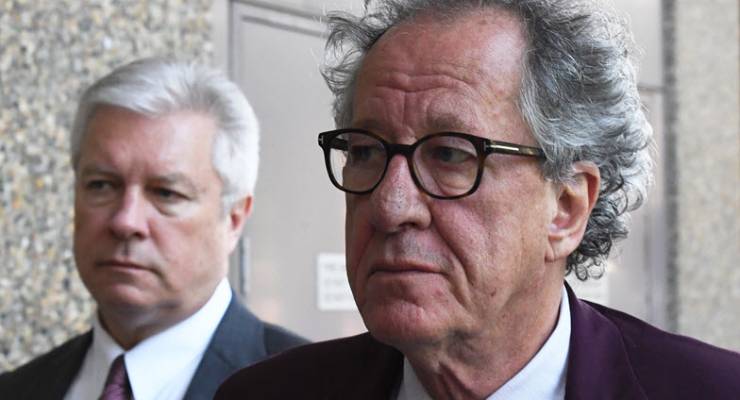
Unless it appeals to the High Court, News Corp’s epic legal battle with actor Geoffrey Rush ended when the full bench of the Federal Court last week rejected its appeal and upheld a record defamation payout of $2.9 million.
But even after a lengthy court case, and appeal, there are still lingering and important questions. Like, how did The Daily Telegraph come to publish the stories in the first place? And what impact will the case have on the Me Too movement in Australia?
Crikey put a series of questions to Telegraph editor Ben English. He refused to answer them, instead referring us to the statement he issued last week in response to the verdict.
Here are the questions, as well as English’s full statement below.
1. It is not clear from the court cases that The Daily Telegraph sought pre-publication legal advice.
a) Can you outline the pre-publication process for the initial and subsequent Rush stories?
b) Were they checked by in-house lawyer Michael Cameron? If not, by who?
c) If possible, can you outline the pre-publication legal opinion (assuming there was one)
d) Whose decision was it to publish?
e) Has there been any disciplinary reaction as a result of the lawsuit?
2. This case has brought into sharp focus the pitfalls in reporting sexual harassment cases.
a) What lessons do you think journalists at News in particular and all journalists in Australia should take from the Rush case about reporting sexual harassment?
b) Has the Rush case had a cooling effect on reporting Me Too cases in Australia?
c)Do you regret reporting the allegations against Rush?
d) What legal changes need to happen to make it easier for journalists to do their job?
3. Tabloid-style reporting has a role in this country and is responsible for many important stories. But the Rush case will be cited as an example of the tabloid press gone wrong.
a) Do you accept that the Rush stories highlight the “dark” side of tabloid reporting and its practices?
b) Would you accept that the Rush stories were rushed and as a direct result of wishing to beat competitors to the punch?
c) What, if anything, do you regret about the Rush stories? (If nothing, is it fair to say you’d do it all again?)
d) Have the Rush stories harmed the reputation of journalism?
Statement from Ben English, editor of The Daily Telegraph:
“In November 2017 The Daily Telegraph published an article based on a public statement by the Sydney Theatre Company that an actor had made a complaint against Geoffrey Rush. While we respect the findings of the Full Court the Rush case exposes the inadequacies of Australia’s defamation laws and heightens the need for urgent legislative reform to enable public debate and to encourage women to come forward with their concerns. In that context we are very disappointed that the appellate court did not reverse Justice Wigneys findings as to the credibility of Eryn Jean Norvill or reverse His Honour’s decision to exclude the testimony of Yael Stone. We support both women in their decision to share their complaints.
“We will continue to report on the issues such as these which are of great concern to the Australian public. As stated by High Court Chief Justice Susan Kiefel last week, there is no place for sexual harassment in any workplace.”








A complaint is an allegation, and to put it into reverse an allegation is a complaint.
That complaint then is still a long way from fact and can’t be treated as fact until all court procedings are completed. The court procedings are now completed.
English’s response for the Telegraph shows that he has learned nothing and forgotten nothing. Casting his newspaper as a victim and seeing the Telegraph as a crusading newspaper is contemptible, flying in the face of reality.
As New Matilda opined, a case such as this exposes the inadequacies of the British adversarial justice system, and the need for the superior French inquisitorial system.
In the meantime, should such shoddy reporting and character assassination arise, it is to be hoped that even more punitive damages will let News Corp realise that their papers are a disgrace.